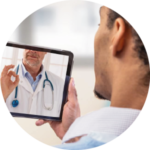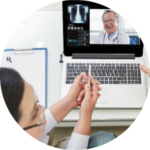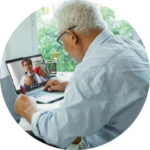
Telehealth is an application that allows patients and healthcare professionals to conduct virtual consultations in a secure, remote and efficient way.
According to the World Health Organization (WHO), telemedicine is a form of healthcare practice that uses digital interactive sound, image and data technologies. It does not only include the provision of healthcare services, consultation, diagnosis and treatment, but also medical training and medical data transfer.
Who can use Telehealth?
• Public or private hospitals
• Clinics
• Sanatoriums
• Medical offices
• Insurance companies
• Health insurance companies
• Prepaid care systems
Why choose Telehealth?
Enables healthcare delivery in remote locations.
Saves patients the need to travel to healthcare facilities or medical offices.
Streamlines scheduling appointments.
Makes following up on chronic diseases easier through remote check-ups.
Allows patients to connect immediately to a variety of healthcare professionals: doctors, dietitians, psychologists, etc.
Makes consultation easier for patients with limited mobility or time constraints.
Offers a safe and trustworthy healthcare platform where the patient can find their prescriptions, medical records and doctors’ directions.
Which are the benefits of using Telehealth for healthcare facilities?

Flexibility: Enables communication between healthcare team members and their patients using a computer, tablet or smartphone.

Savings: Facilities operating expenses are reduced by eliminating the need to house medical offices, infrastructure and personnel. Appointments are optimized and profitability is increased.

Innovative technology: Data is updated constantly. Patient data is stored in a secure way using control mechanisms like AI, face and fingerprint recognition, etc.

Security: Compliance with all security protocols that guarantee patients’ rights and personal data privacy.

Digitization: Makes process planning and organization easier in an orderly way.

Remote work: Enables healthcare professionals to work from anywhere outside the facilities.

Environmental protection: Reduces the use of printed materials, like prescriptions, medical records, etc.
